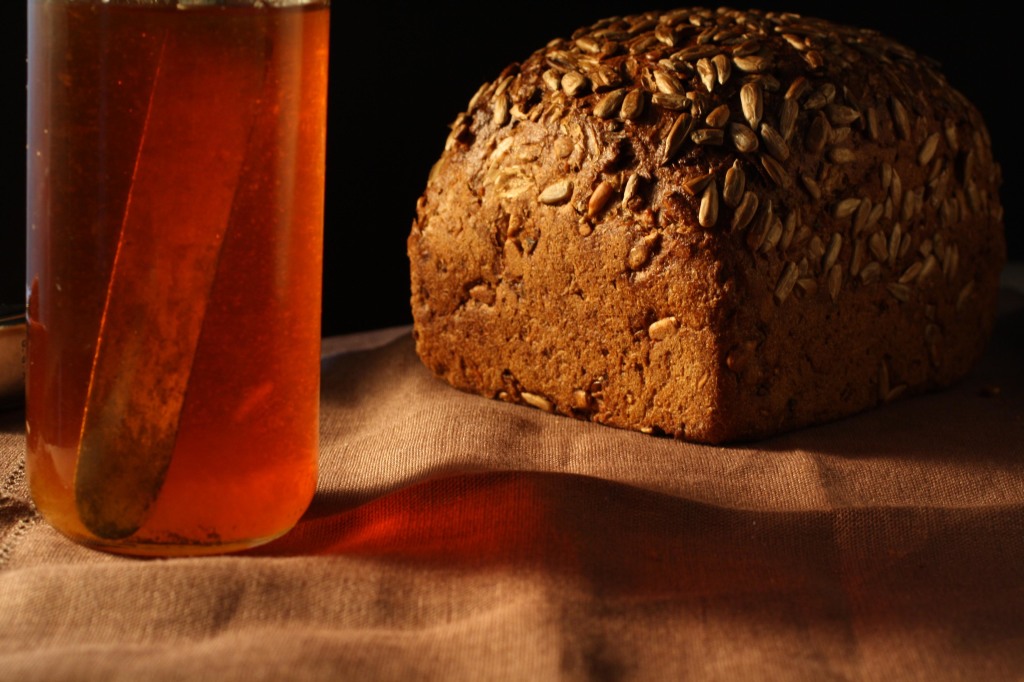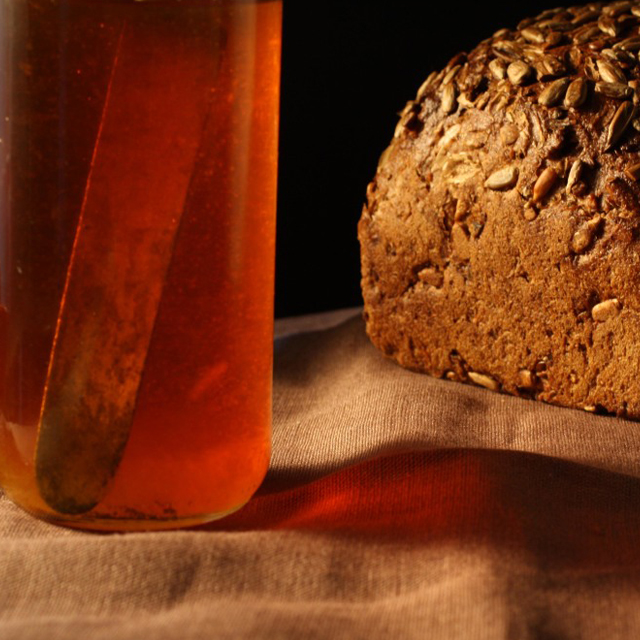
Words can stick like dried honey to a countertop, catching any stray bit of paper towel. They can swirl and fuse into a person like stirring a spoonful of honey from a jar into a hot mug of tea. Sometimes we can be so carefree with our words, forgetting this quality they possess that rivals the handiwork of honeybees. Sometimes, we linger on words spoken a long time ago, letting them marinate within us that our response might tenderize until the right time.
One evening this past winter, a chill pierced the air that could penetrate even the thickest Ugg boots or puffy jacket. I had set out cross-town in San Francisco to attend a poetry reading and arrived early knowing the race might be on for the metered parking spots, free after 7 p.m. It had been months, since I had attended a reading. It didn’t help that I was a walking ball of influenza, all half-used tissues and sniffles, wrapped in layers of black outerwear. I kept to myself until I couldn’t keep myself from seeking out people to talk to, visually apologetic for my sorry state but not so disapproving of my health that I would let it keep me from indulging in listening to some favorite poets inflect their poems with their voices. To read a poem aloud is to give it new breath and life, to discover another side of it like unexpectedly catching someone you love doing something kind for a stranger. We crave igniting our aural capabilities. In that way reading a poem on the page and hearing the author pause in different spots than the line breaks on a page which stop the eye is akin to releasing the poem anew.
What pulled me out of bed and into the bookstore reading that night were the poets lined up to read from recent collections and getting to see Chard de Niord, who with Jacqueline Gens, had co-created the MFA Poetry program at New England College, of which I am an alumnus. The evening’s reading began. Peter Everwine read softly, his vowels long and his consonants clustering around each other. I craned forward then, determined not to miss one word and surprised as my eyes glistened as if on command when he finished reading a poem that caught me in its net and held me in the quiet space just after a poem finishes and before people begin clapping. The imagery kept me cornered in his mother’s kitchen, my eyes fixed on her rag rug that served as a striking symbol of grief. Chard de Niord stepped forward and read with tenderness, leaning ever so slightly on the podium, caught in the current of words he had penned but had taken on their own life. Alejandro Murguía spoke of finding love in Paris, even as the listener knew early on that this love would not last, even as the listener ate the clues of foreshadowing that would take the beloved back to Caracas. Forrest Gander told a story describing the human need for connection with such fluency it left me breathless.
When the reading ended, I sat there, still soaking in the words and truths relayed in the small span of an hour, feeling changed. With glassy eyes and still sniffling my way through a purse-sized pack of tissues, I introduced myself to another poet in this room made up mainly of poets. As we navigated our introductions, I described the food poetry that’s kept my attention the reading regimen of cookbooks and poetry books. He scoffed, not meanly, but said, “What good writing can there be in cookbooks?”
It’s been many months since that poetry reading and the scoffing poet’s words continue to bubble up within me like a tomato sauce that simmers for several hours, letting the ingredients concentrate. What I think the scoffing poet was missing that night, is that cookbooks possess their own possibility for weaving a good narrative or lyrical play of language if done well. What I think the scoffing poet was pointing to that evening is an innate need to push the Word forth. As someone who jots recipes down on scraps of paper pocked with sauce in my kitchen and occasionally shares them in this spot of the internet, I, too am perplexed by the formulaic qualities of recipe-writing, but then, just as quickly, I can be dazzled by a writer who displays a sense of voice with clarity of instruction and the right choice of evocative detail. I think that might just be as hard as writing a really good humorous poem. The key is to not muddle the method with so much self that it is cloying, but instead, to also not be afraid to step out of the norms of recipe diction (within the parameters of a publishing house style guide).
The scoffing poet’s words pushed me forward to consider what good writing looks like in a recipe, while adhering to a recipe’s particular requirements. I can certainly attest to the necessity of tightening language even after it seems like a belt that’s been cinched one rung too snug before Thanksgiving supper. In my own experience, crafting a cookbook reminds me so much of sitting among sheaves of poems strewn on the ground, determining how they thread together into a chapbook and in which order. Writing a recipe requires the concision of language that poetry already understands. The heart of the writer and their personality often come out in head notes.
If I could continue the conversation with the scoffing poet, I would underscore the opportunity in head notes. They can give explanation for any oddities that might throw off a home cook in the instructions. They also sometimes tell a story that threads the recipe into the larger narrative of life. Poetry and poetic devices with their keen eye of economy can disturb the status quo of the ho hum head note. Is it be possible for a cookbook to win a Pulitzer Prize or a National Book Award? It is a question I brought up to a friend that elicited a guffaw for my bravado. I look forward to clapping aloud for the food writer who clinches that golden apple, if it is one that can be extended to members of the cooking community. That it hasn’t been done yet is impetus for cookbook writers to set writing goals as high as recipe testing limits. There is much yet to excavate.

I absolutely love this post, Annelies. I think a recipe can be like a poem, concise, minimal and evocative. And writing headnotes (especially for an entire book) is not only a challenge but an opportunity for the perfect blend of wisdom, storytelling, and voice.
Thanks Lynda! I love to think of that space of synchronicity where the ingredients, method, headnotes and even the look of the final dish all inform one another to bring the home cook into the experience. Trying to define a “good” headnote can sometimes come down to what kind of space is permissible along with trying to put yourself in the home cook’s shoes and look at the recipe from an outside perspective, asking yourself what might be unclear or problematic. Then, adding in story-telling while aiming for brevity so as to not confound (by length) the home cook creates another layer. I have so much respect for recipe writers and the particular complexities inherent in the form.
Inspired! I struggle with balancing all the written components of a recipe to create an approachable dish and an interesting read. I hope to see a Pulitzer go to a cookbook author it would be a marvelous honor.
Right, Rose? I think it would be the coolest thing ever to see a cookbook author get a Pulitzer. I will be happy to share that news from the rafters! Recipe writing is such a specific form and to do it well requires finesse. Your quandaries are ones that I’m guessing most recipe writers grapple with regularly. You and I are not alone in that challenge.
Once, at a poetry/fiction reading dedicated to the topic of serendipity, in a quiet cabin only accessibly by hiking a few miles, a friend read a recipe for rice pudding. It transfixed me then, and I still grin at the candle-lit memory.
How wonderful–the scenery of your poetry reading provided such a great backdrop for a rice pudding recipe.
What a wonderful article Annelies, so full of your passion and humor. I only wish I could string words together as poetically and movingly as you do. Brava!!
Thanks Jane!
I totally see the best cookbooks to be as engrossing and readable (and digestable? 😉 ) as fiction. Hopefully we are headed that way… National Book Award in one hand, whisk in the other, perhaps?
Lovely entry, hope you are well!
Thanks Katie. I agree- I’ve been taking my time enrapt in “L.A. Son” by Roy Choi. He has a gift for narrative that sucks the reader into the vortex of his personal story and recipes.
I love this; so much truth here. A book of poetry and a cookbook aren’t all so different when written well/with heart/with loving detail. I would attend a book reading by a cookery author just as much as a poet when the same talent and warmth and gift for diction and story-telling is poured into the work. I look forward to the day the Pulitzer encompasses all writing gifts; I’ll point to this post when it happens.
Rona- There is something about good writing that is transfixing. I know how you get when you have happened upon a book that takes over your social calendar- it is one of the best feelings in the world to find that kind of connection with a story. I think the call-to-action to cook (or not) is an interesting bit of a cookery book. It asks something from the reader and perhaps even changes their lives visibly by inviting them into its experience and making it their own.
Right, Rona? The illustrious Jonathan Gold has claimed pulitzer prizes for his restaurant criticism. I know this feat of his is something food writers cheer on. Here’s a link to check out his work.
http://www.pulitzer.org/works/2007-Criticism